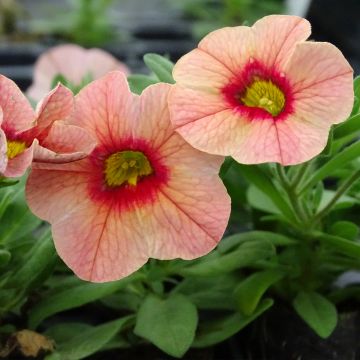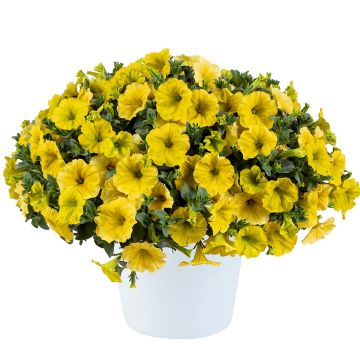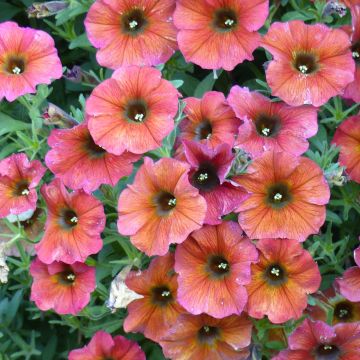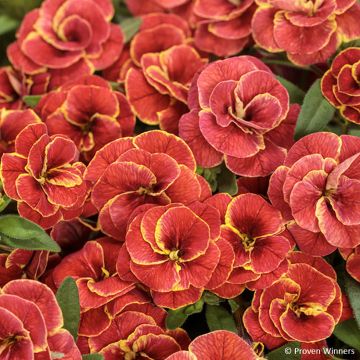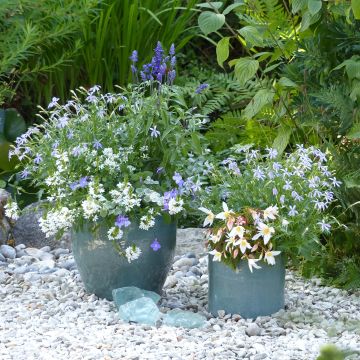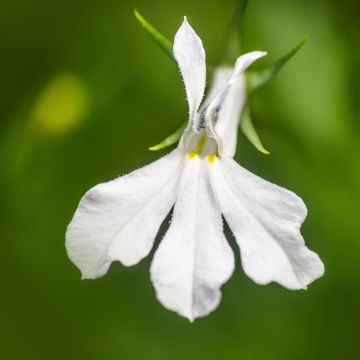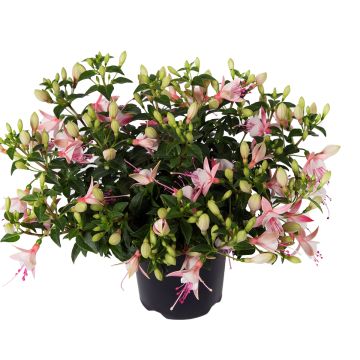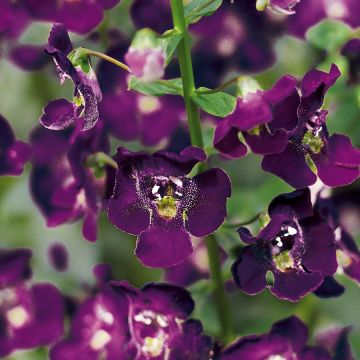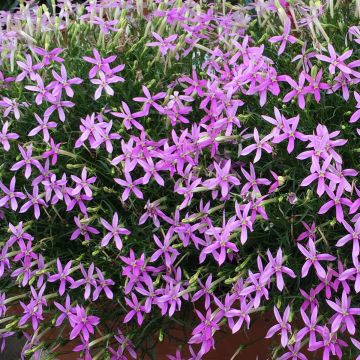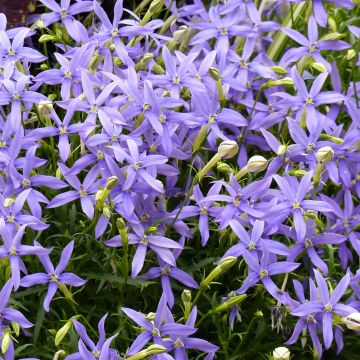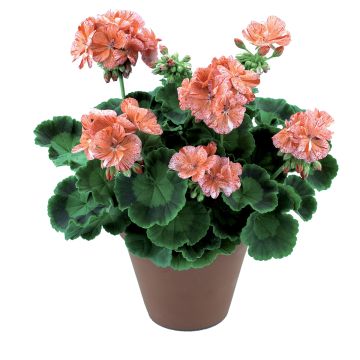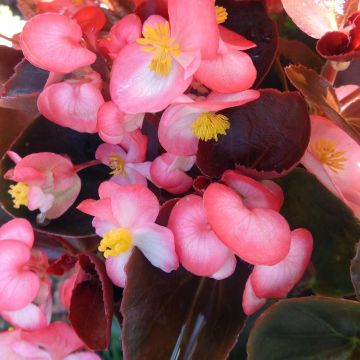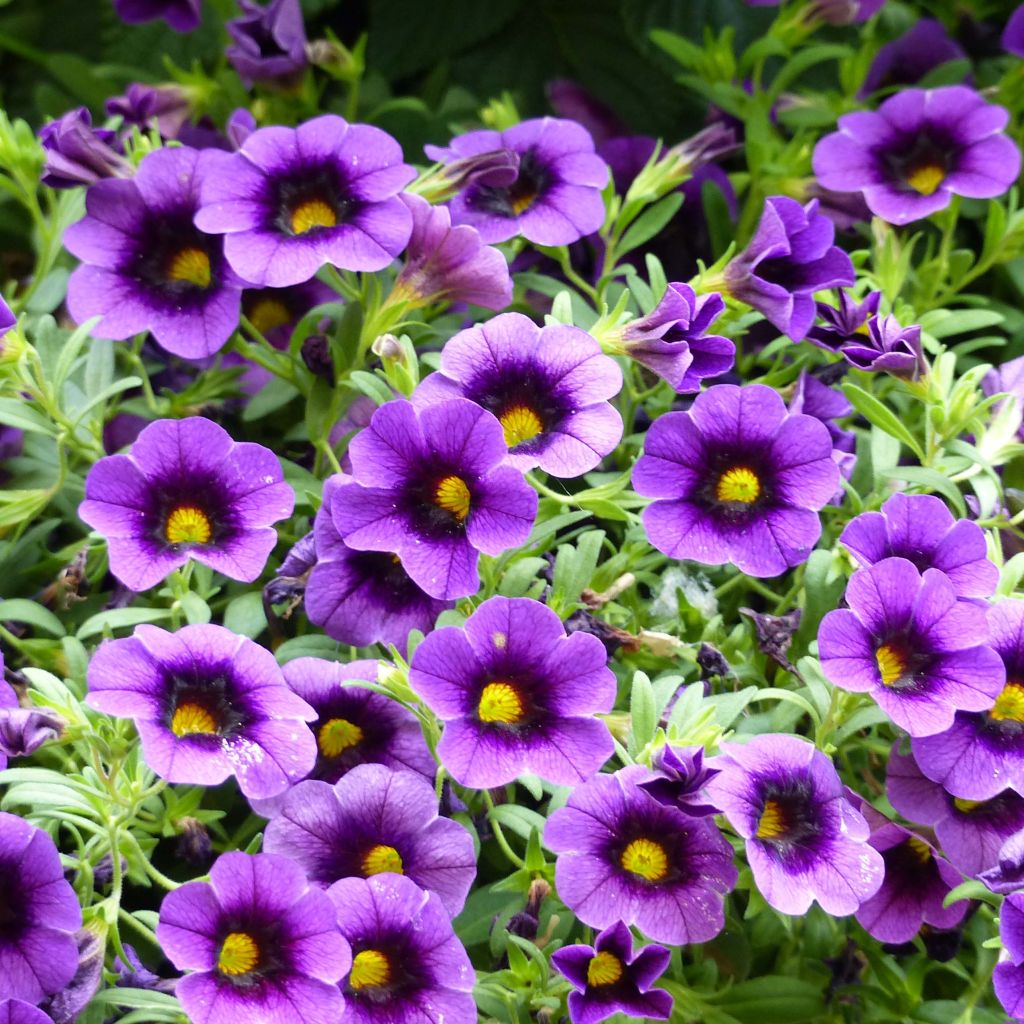

Calibrachoa Superbells Grape Punch - Mini Petunia
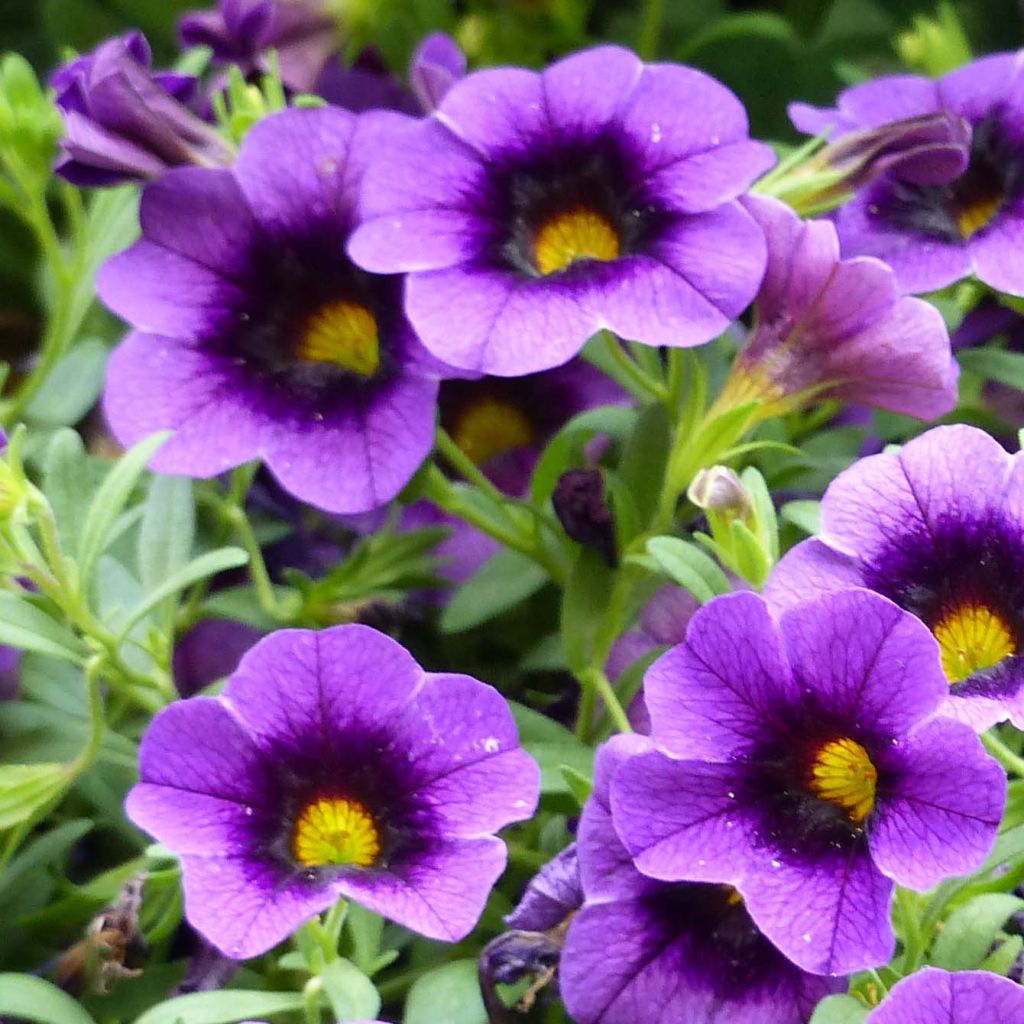

Calibrachoa Superbells Grape Punch - Mini Petunia
Calibrachoa Superbells Grape Punch - Mini Petunia
Calibrachoa hybrida Superbells Grape Punch
Very pretty flowers but they quickly got too hot. So they quickly went to seed. What a shame.
Anne, 29/10/2022
This item cannot be shipped to the selected country
Delivery charge from €5.90
More information
Schedule delivery date,
and select date in basket
This plant carries a 6 months recovery warranty
More information
We guarantee the quality of our plants for a full growing cycle, and will replace at our expense any plant that fails to recover under normal climatic and planting conditions.
From €5.90 for pickup delivery and €6.90 for home delivery
Express home delivery from €8.90.

Does this plant fit my garden?
Set up your Plantfit profile →
Description
The Calibrachoa Superbells Grape Punch enriches the range of Mini-Petunia Superbells with its light two-tone purple flowers, punctuated with small yellow centres. Its rapid and vigorous growth is the source of its very beautiful both compact and trailing habit, which wonderfully serves its inexhaustible flowering. Its long flexible stems are adorned with small green, pointed leaves that remain impeccable throughout the season. This annual is very easy to grow in sunny locations in light, fertile, and not too dry soil.
Calibrachoa, sometimes called Million Bells, are tender perennials often grown as annuals. Very close to petunias, they differ in the number of chromosomes that make up their genetic heritage and some morphological characteristics: their blooms are smaller and more rain-resistant, their growth is shrubby or herbaceous with woody stems, their development is less voluminous, and they are more drought- tolerant. The hybrids that make up this group all belong to the Solanaceae family (like tomatoes) and probably descend from an Argentinian species called Petunia integrifolia.
The 'Superbells Grape Punch' variety quickly forms a dense and wider than tall mound of 25 to 30 cm (10 in to 1 ft) in height and 40 to 60 cm (1 ft 4" to 2 ft) in diameter. Its flexible stems are densely covered along their entire length with lanceolate, evergreen, velvety and slightly hairy small leaves of medium green colour. Its tireless flowering takes place from June until the first frosts. Many small funnel-shaped flowers emerge from the axils of the leaves; they are 3 to 4 cm (1.2-1.7 in) wide, bright purple veined with darker purple lines, around a dark purple neck. Unlike petunias, these calibrachoas do not need to be pruned during the season. Their flowering habit is known as 'self-cleaning', which means that the faded flowers drop off spontaneously.
Calibrachoa 'Superbells Grape Punch' is ideal in hanging baskets, planters, or pots, but its heat and drought tolerance as well as its vigour also allow it to be planted out in the ground, in very well-drained soils, where it will form very pretty borders and displays of intense colour in flowerbeds or rockeries. It can be planted alone or accompanied by 2 or 3 other varieties with complementary colours (mauve, pale yellow, pink), in tubs, flowering pots, balcony planters on terraces, balconies, or patios. Mini-petunias are also good verandah plants. Their association with verbenas, surfinia petunias, double bacopas, and nemesias is remarkable. The choice is vast and allows free rein to the imagination and tastes of every gardener, even inexperienced ones.
Please note: warning: our young plants in mini-pots are professional products intended for experienced gardeners: upon receipt, transfer and store them under cover (verandah, greenhouse, cold frame...) at a temperature above 14°C for a few weeks before planting outdoors once the risk of any frosts has definitively passed.
Report an error about the product description
Calibrachoa Superbells Grape Punch - Mini Petunia in pictures
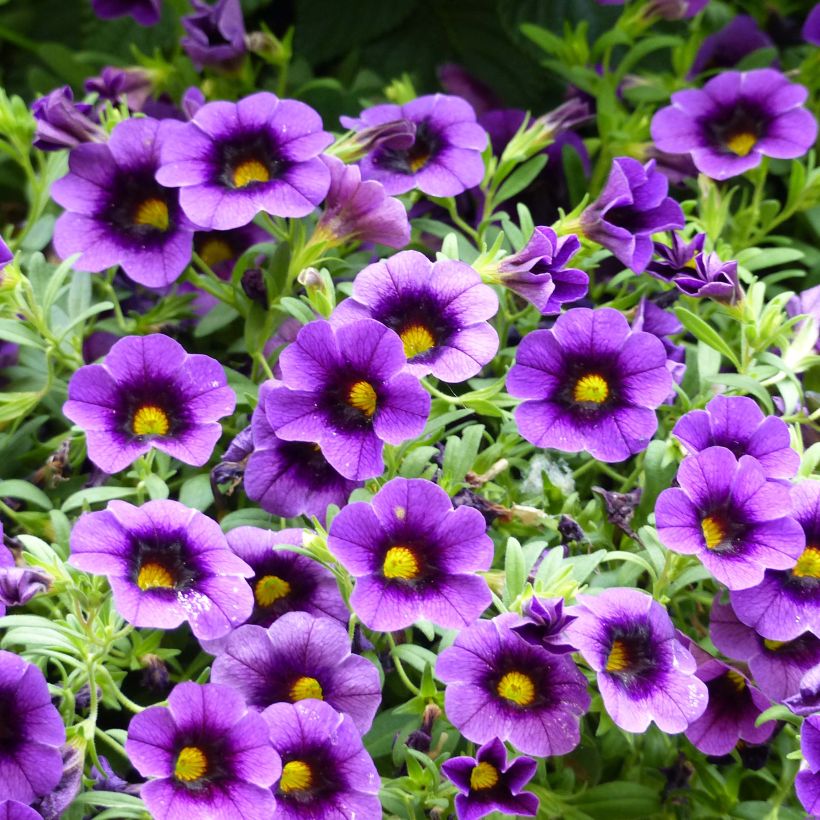

Flowering
Foliage
Plant habit
Botanical data
Calibrachoa
hybrida
Superbells Grape Punch
Solanaceae
Cultivar or hybrid
Other Calibrachoa or Mini-petunia
Planting and care
You can plant your Superbells Calibrachoas in the ground or in a pot. If you wish to plant them out in the ground, wait until the last heavy frosts have passed. In the meantime, you can pre-cultivate them in pots in a warm and bright place to accelerate their growth. Superbells Calibrachoas will flower from June to October. Plant them in a sunny location sheltered from the wind. They need a light and humus-rich but above all well-drained soil. Do not over-water them at the beginning of their growth as they are sensitive to excess moisture. They tolerate drought well but will need regular watering during hot summer days. Very floriferous and fast-growing, they are hungry plants. We recommend feeding them with a liquid fertiliser for surfinias once or twice a week during the growing season.
Planting period
Intended location
Care
-
, onOrder confirmed
Reply from on Promesse de fleurs
Plug plants - Annuals
Haven't found what you were looking for?
Hardiness is the lowest winter temperature a plant can endure without suffering serious damage or even dying. However, hardiness is affected by location (a sheltered area, such as a patio), protection (winter cover) and soil type (hardiness is improved by well-drained soil).

Photo Sharing Terms & Conditions
In order to encourage gardeners to interact and share their experiences, Promesse de fleurs offers various media enabling content to be uploaded onto its Site - in particular via the ‘Photo sharing’ module.
The User agrees to refrain from:
- Posting any content that is illegal, prejudicial, insulting, racist, inciteful to hatred, revisionist, contrary to public decency, that infringes on privacy or on the privacy rights of third parties, in particular the publicity rights of persons and goods, intellectual property rights, or the right to privacy.
- Submitting content on behalf of a third party;
- Impersonate the identity of a third party and/or publish any personal information about a third party;
In general, the User undertakes to refrain from any unethical behaviour.
All Content (in particular text, comments, files, images, photos, videos, creative works, etc.), which may be subject to property or intellectual property rights, image or other private rights, shall remain the property of the User, subject to the limited rights granted by the terms of the licence granted by Promesse de fleurs as stated below. Users are at liberty to publish or not to publish such Content on the Site, notably via the ‘Photo Sharing’ facility, and accept that this Content shall be made public and freely accessible, notably on the Internet.
Users further acknowledge, undertake to have ,and guarantee that they hold all necessary rights and permissions to publish such material on the Site, in particular with regard to the legislation in force pertaining to any privacy, property, intellectual property, image, or contractual rights, or rights of any other nature. By publishing such Content on the Site, Users acknowledge accepting full liability as publishers of the Content within the meaning of the law, and grant Promesse de fleurs, free of charge, an inclusive, worldwide licence for the said Content for the entire duration of its publication, including all reproduction, representation, up/downloading, displaying, performing, transmission, and storage rights.
Users also grant permission for their name to be linked to the Content and accept that this link may not always be made available.
By engaging in posting material, Users consent to their Content becoming automatically accessible on the Internet, in particular on other sites and/or blogs and/or web pages of the Promesse de fleurs site, including in particular social pages and the Promesse de fleurs catalogue.
Users may secure the removal of entrusted content free of charge by issuing a simple request via our contact form.
The flowering period indicated on our website applies to countries and regions located in USDA zone 8 (France, the United Kingdom, Ireland, the Netherlands, etc.)
It will vary according to where you live:
- In zones 9 to 10 (Italy, Spain, Greece, etc.), flowering will occur about 2 to 4 weeks earlier.
- In zones 6 to 7 (Germany, Poland, Slovenia, and lower mountainous regions), flowering will be delayed by 2 to 3 weeks.
- In zone 5 (Central Europe, Scandinavia), blooming will be delayed by 3 to 5 weeks.
In temperate climates, pruning of spring-flowering shrubs (forsythia, spireas, etc.) should be done just after flowering.
Pruning of summer-flowering shrubs (Indian Lilac, Perovskia, etc.) can be done in winter or spring.
In cold regions as well as with frost-sensitive plants, avoid pruning too early when severe frosts may still occur.
The planting period indicated on our website applies to countries and regions located in USDA zone 8 (France, United Kingdom, Ireland, Netherlands).
It will vary according to where you live:
- In Mediterranean zones (Marseille, Madrid, Milan, etc.), autumn and winter are the best planting periods.
- In continental zones (Strasbourg, Munich, Vienna, etc.), delay planting by 2 to 3 weeks in spring and bring it forward by 2 to 4 weeks in autumn.
- In mountainous regions (the Alps, Pyrenees, Carpathians, etc.), it is best to plant in late spring (May-June) or late summer (August-September).
The harvesting period indicated on our website applies to countries and regions in USDA zone 8 (France, England, Ireland, the Netherlands).
In colder areas (Scandinavia, Poland, Austria...) fruit and vegetable harvests are likely to be delayed by 3-4 weeks.
In warmer areas (Italy, Spain, Greece, etc.), harvesting will probably take place earlier, depending on weather conditions.
The sowing periods indicated on our website apply to countries and regions within USDA Zone 8 (France, UK, Ireland, Netherlands).
In colder areas (Scandinavia, Poland, Austria...), delay any outdoor sowing by 3-4 weeks, or sow under glass.
In warmer climes (Italy, Spain, Greece, etc.), bring outdoor sowing forward by a few weeks.

































